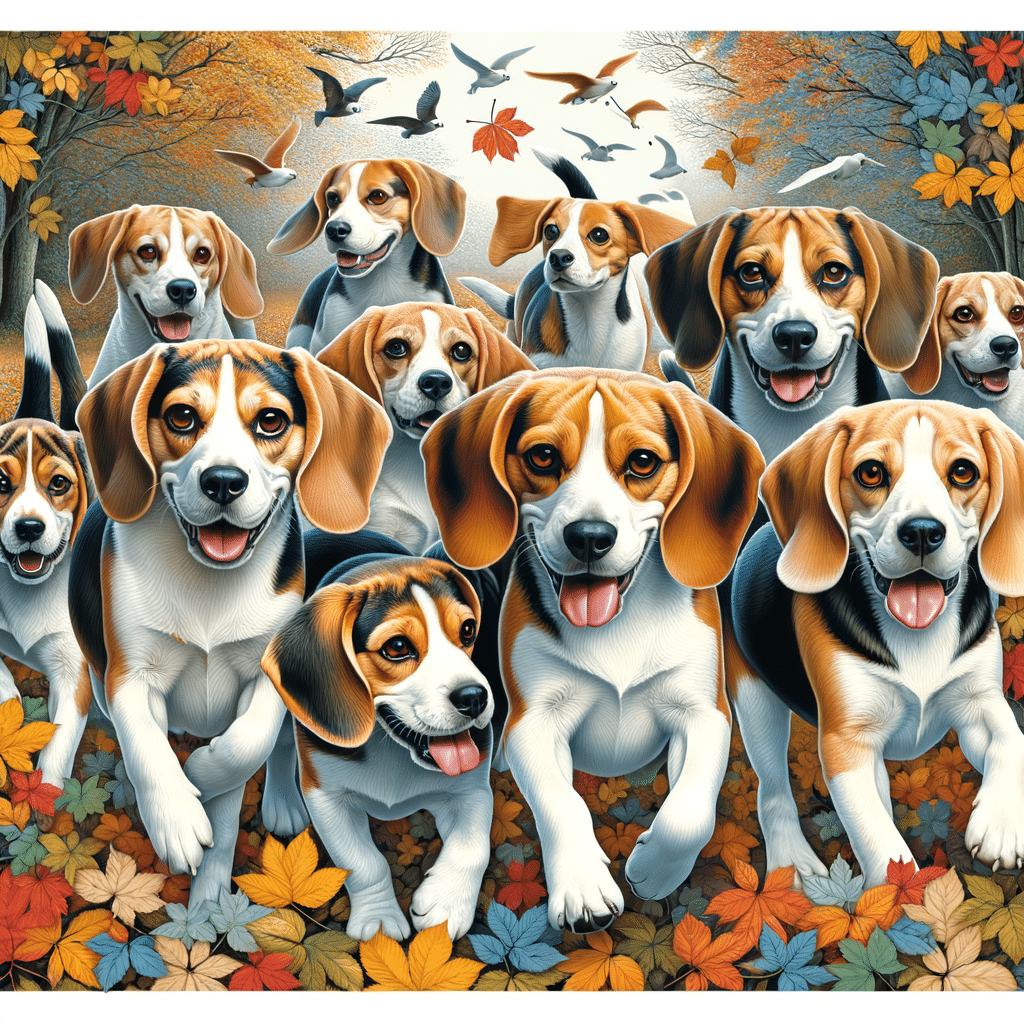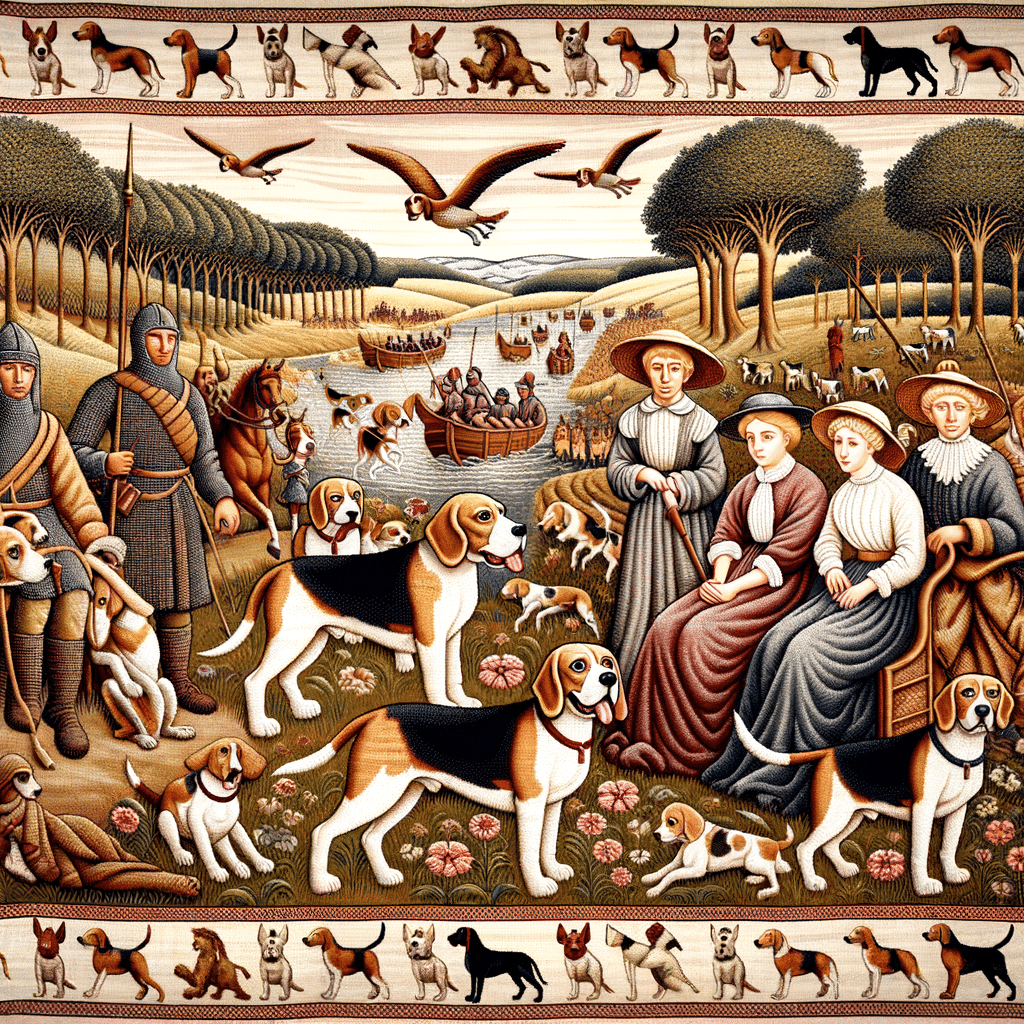When deciding to bring a new furry companion into the home, it’s vital to understand the differences between breeds to ensure a good fit for both the dog and the family. The beagle vs. golden retriever breed analysis shows two popular breeds with distinct characteristics that appeal to pet owners.
In This Article
Beagles have a compact size and are easy to groom, making them an excellent choice for those with limited living space. In contrast, golden retrievers are larger, highly intelligent, and trainable dogs that require more visits to a dog groomer, thanks to a long-hair coat. They love active outdoor lifestyles, which also prevents overweight dogs.
Understanding each breed’s needs is crucial to an ideal relationship. Initially bred for hunting, beagles possess a strong instinct to follow scents, which means they require secure areas to explore. They can be vocal. Golden retrievers, with their roots as hunting companions, are known for their affectionate nature and eagerness to please, often making them ideal family pets. Each breed has distinct health considerations due to its physical traits, which potential owners should understand.
Highlights
- Beagles are small, easier to groom, and suit smaller living spaces, while golden retrievers are larger, require more grooming, and thrive in active settings.
- Beagles have strong instincts and can be vocal, whereas golden retrievers are affectionate and excel in training.
- Potential owners need to consider the different health needs and physical traits of each breed before making a decision.
Breed Origins and History
The origin stories of the beagle and the golden retriever offer fascinating insights into their development as distinct breeds known for their exceptional abilities as hunting dogs in England and Scotland, respectively.
Beagle History
The beagle dog has a storied history that traces back to England. These are popular dog breeds thought to have descended from hounds used in Norman, England, for tracking small game primarily due to their acute sense of smell and agile builds. Historical references to the breed date as far back as Ancient Greece, though the name “beagle” was first documented in the 15th century. Over centuries, the beagle has been prized for its prowess as a hunting dog, particularly for hare hunts, which was known as “beagling.
Golden Retriever History
The golden retriever dog was first developed in Scotland during the 19th century by Sir Dudley Marjoribanks, also known as Lord Tweedmouth. This breed’s origins can be attributed to the crossing of a now-extinct yellow-colored retriever with the Tweed water spaniel and later with other breeds such as the Irish setter, bloodhound, and more strains of water spaniels. The intent was to create a capable gun dog suitable for the rainy climate and rugged terrain of the Scottish Highlands, adept at retrieving waterfowl and game birds without damage.
Physical Traits and Health
When comparing the beagle and golden retriever, notable distinctions arise in their physical characteristics, particularly in size and weight, as well as the extent of grooming each breed requires. Dog health issues, while varying for each breed, present important considerations for potential owners, including watching for dental disease and undergoing lab tests.
Size and Weight
Beagle
- Height: 13-15 inches.
- Weight: 20-30 lbs for smaller beagles, up to 35 lbs for larger ones.
Golden Retriever
- Height: 21-24 inches.
- Weight: 55-75 lbs.
Coat and Grooming Needs
Beagle
- Coat: Short and weather-resistant, requiring minimal grooming.
- Maintenance: Regular brushing suffices, reducing shedding and keeping the coat clean.
Golden Retriever
- Coat: Dense and water-repellent with a thick undercoat.
- Grooming: Regular brushing, at least twice a week, is required to manage shedding and prevent matting.
Common Health Issues
Beagle
- Lifespan: Typically 12-15 years.
- Notable health issues:
- Epilepsy
- Hypothyroidism
- Intervertebral disk disease
- Beagle dwarfism
- Glaucoma
- Patellar luxation
Golden Retriever
- Lifespan: Generally 10-12 years.
- Common health concerns:
- Hip dysplasia
- Elbow dysplasia
- Hemangiosarcoma
- Heart issues
- Progressive retinal atrophy
- Skin conditions
Both breeds may be prone to specific hereditary conditions, which underscores the importance of regular health check-ups and purchasing from reputable breeders who employ responsible breeding practices to minimize the risk of genetic disorders.
Personality and Temperament
When comparing the beagle and the golden retriever, their personality and temperament differences stand out, with each breed possessing unique and well-defined behavioral traits. They are both known for being friendly and affectionate with families but vary in energy levels and trainability.
Behavioral Traits
Beagles are generally joyful and adventurous dogs. They have a reputation for being:
- Energetic
- Curious by nature
- Determined and occasionally stubborn
They are not couch potatoes, as their robust sense of smell drives their exploratory behavior. Beagles can be great with children, but socialization is key for them to channel their energy positively.
Golden retrievers, in contrast, are:
- Loving and affectionate
- Laid-back and reliable
- Sociable with both humans and other animals
Goldens showcase a loyal temperament and tend to have a balanced energy level that makes them less prone to wandering off due to their strong desire to be near their human companions.
Trainability and Intelligence
Golden retrievers are known for their intelligence and eagerness to please, which makes them:
- Highly trainable
- Responsive to obedience training
- Good at socialization
They learn commands quickly and are often used as service dogs due to their reliable and trainable nature.
Beagles, while intelligent, often have:
- A more independent streak
- Stubbornness, which can affect trainability
Though they are affectionate, their curiosity might require more patience during training sessions. Consistent and positive training methods work best to capitalize on their energetic personality.
Lifestyle Compatibility and Care
Choosing between a beagle and a golden retriever largely depends on a family’s lifestyle and the care they’re able to provide. Both breeds have distinct care needs, from daily exercise to space requirements, and understanding these can help determine which breed best fits a potential owner’s way of life.
Exercise and Activity Requirements
Golden retrievers are energetic and require daily physical activity to stay healthy. Generally, they need at least an hour of robust exercise per day, which can include fetch games, jogging, and swimming. Due to their history as hunting dogs, they often enjoy retrieval games and outdoor activities.
In contrast, beagles have a moderate activity level. Although they were initially bred for hunting, their size and temperament make their exercise needs slightly less demanding than golden retrievers. A beagle typically requires at least 30 minutes to one hour of exercise daily, which can be satisfied with walks and the opportunity to sniff and explore securely off-leash whenever possible.
Living Environment
Golden retrievers adapt well to various living environments but should preferably have a spacious home with a fenced yard to accommodate their size and exercise needs. Their social nature also makes them less ideal for long periods of solitude. Due to their moderate to high shedding, regular grooming requirements should be considered, especially for allergy sufferers.
On the other hand, beagles can thrive in an apartment setting as long as their exercise needs are met. They are smaller and, thus, more adaptable to confined spaces but still require mental stimulation to prevent boredom-related behaviors such as barking. Their grooming needs are minimal, making them a lower-maintenance option for families or individuals who might not have the time for frequent grooming.
Suitability for Families
Both breeds are known for being great with children and can make excellent family pets. Golden retrievers are well-regarded for their gentle temperament, intelligence, and capacity for training with positive reinforcement. They often show protective instincts without aggressive guarding traits, making them friendly companions rather than guard dogs.
Beagles are similarly affectionate and social. They may suit families looking for a smaller dog with a typically cheerful demeanor. As with any breed, however, early socialization and consistent training are crucial for integrating a beagle into a family setting, particularly since, due to their hunting dog background, they can be distractible by scents.
Both breeds may be prone to obesity if overfed and under-exercised, so maintaining a daily exercise routine and proper diet is vital in their care.
Frequently Asked Questions
In this section, readers can find clear and concise answers to common queries regarding the comparison of beagles and golden retrievers. The focus is on temperament, exercise, grooming, suitability for families, and their trainability, intelligence, and health concerns.
What are the main differences in temperament between beagles and golden retrievers?
Golden retrievers are known for their friendly and obedient nature, often seeking the affection of their owners. Beagles, on the other hand, are more independent and seem to have a curious and mischievous temperament.
How does the exercise needs of a beagle compare to that of a golden retriever?
Beagles require significant daily exercise due to their high energy levels and hunting instincts. Golden retrievers also need regular physical activity but will typically be content with slightly less intense exercise than beagles.
Can you discuss the grooming requirements for beagles and golden retrievers?
Due to its short coat, the beagle is considered easier to groom. Meanwhile, a golden retriever requires frequent brushing to manage its longer fur and reduce shedding.
What are some considerations when choosing between a beagle and a golden retriever for a family pet?
When selecting a family pet, one should consider the golden retriever’s gentle disposition and high sociability with children, as opposed to the beagle’s independent personality and potential for loud vocalizations.
How do the trainability and intelligence of beagles compare to golden retrievers?
Golden retrievers are often easier to train because they desire to please their owners and their high intelligence. Beagles can be trained effectively but may need more patience and consistency because of their strong-willed nature.
What should potential owners know about the health concerns common in beagles and golden retrievers?
Be aware that beagles may be prone to obesity, epilepsy, and disc diseases, while golden retrievers can face health issues such as hip dysplasia, certain cancers, and heart problems. Regular veterinary check-ups and a healthy lifestyle are essential for both breeds.






